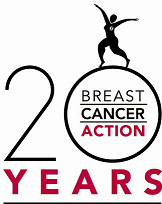 It’s October again: breast cancer awareness month. Women’s magazines are featuring stories about breast cancer, charitable events all over North America are raising money for breast cancer research, and retailers are urging you to shop to cure breast cancer.
It’s October again: breast cancer awareness month. Women’s magazines are featuring stories about breast cancer, charitable events all over North America are raising money for breast cancer research, and retailers are urging you to shop to cure breast cancer.
Read those stories, run for the cure, but – at the behest of Breast Cancer Action – think before you pink. National chains and brand names aside, some of the more questionable vendors, hawking wares to consumers, leave one wondering how breast cancer became such “big business”. Who will want a cure, or effective prevention strategies, if it will mean putting a lot of people out of work? Including manufacturers who make mammography machines, and pharmaceutical companies that focus on breast cancer drugs.
Breast Cancer Action positions itself as “the watchdog of the breast cancer movement“. They are the only national breast cancer organization in the United States that does not accept money from any source that profits from breast cancer. Their position on shopping in support of breast cancer awareness is clear:
Think Before You Pink™, a project of Breast Cancer Action, launched in 2002 in response to the growing concern about the number of pink ribbon products on the market. The campaign calls for more transparency and accountability by companies that take part in breast cancer fundraising, and encourages consumers to ask critical questions about pink ribbon promotions.
This October, consider carefully how you will demonstrate your breast cancer awareness. “After all”, as Breast Cancer Action notes, ” if shopping could cure breast cancer, it would be cured by now.”


What we could really use is awareness of what products, like food, cosmetics and household cleaners, are linked to cancers and prevention of consuming those products.
Check out the Breast Cancer Action website. They’ve done some great stuff on these issues.
The recent population-based article from Norway suggests that routine population-
wide screening mammography at best saves 2% of deaths from breast cancer (New Eng-
-land Journal of Medicine Sept. 2010). This is something to think about.
Many women had false positives and got scared to death.
I will keep on doing monthly breast self-examinations as my primary screening.
It’s really important to actually start preventing breast cancer. I think
when we understand its connections with ovulatory disturbances we’ll be on
track to start prevention.